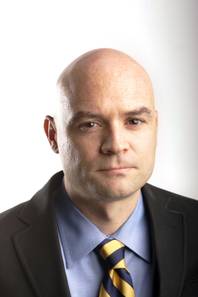
Gary Loveman, president, CEO and chairman of Harrah’s Entertainment, delivers a keynote address during the Global Gaming Expo (G2E) at the Las Vegas Convention Center Wednesday, November 17, 2010. Loveman’s keynote was titled “The Stockholm Syndrome: Why Addressing the Misinformation that Plagues Gaming is our Top Priority.”
Thursday, Jan. 24, 2013 | 2 a.m.

J. Patrick Coolican
Sun coverage
I suppose it’s fitting that a guy who is the chief executive of a company with nearly $20 billion in long-term debt would be lecturing us on fiscal probity.
I’m speaking of Caesars Entertainment CEO Gary Loveman, who is part of a corporate poobah group called the Business Roundtable. As chairman of the roundtable’s health and retirement committee, Loveman has been the public face of a recent proposal that purports to rein in entitlement costs so we can keep programs such as Social Security and Medicare solvent for future generations.
They might have picked a more appropriate spokesman. Last year Fitch, the ratings agency, downgraded Caesars debt from “stable” to “negative.”
Putting that aside, Loveman is an accomplished executive and an MIT-trained economist. So, about those proposals.
Some are decent, such as including state and local government workers in the Social Security system, instituting a new minimum benefit that ensures a full-career worker would be above the poverty line, and encouraging more private saving among workers and young people in particular.
Some are OK with caveats, like adjusting the way we calculate cost-of-living increases, as long we shield the poorest beneficiaries. Reducing benefits for wealthy beneficiaries is okay, as long as everyone receives some benefits. Otherwise, the programs would quickly be portrayed as “welfare” and would lose the near unanimous public support that keep them from being axed.
Some of the ideas, however, are terrible.
To begin with, the proposals for both Medicare and Social Security do not apply to people aged 55 and older. This is nothing but a political ploy to prevent senior citizens, who vote in large numbers, from burning down the capital. But I see no rational policy reason why significant benefit cuts should apply to people who are 54 years and 364 days old, but not to someone who is 55.
On the Medicare side, the proposal calls for raising the eligibility age from 65 to 70. It’s not clear what the savings would be, but an analysis of raising the age to 67 determined $5.7 billion in net federal savings in its first full year. As Maura Caslyn, a health care analyst at the liberal-leaning Center for American Progress notes, the problem is that raising the eligibility age would cost everyone else — states, employers and individuals — $11.4 billion. It would actually increase overall health spending, which the rest of us would help pay.
Why would it increase overall health spending? Because Medicare is cheaper. Despite what you’ve heard about big bloated and inefficient government, Medicare pays far less than private insurers to health care providers because of its size and buying power. So, instead of a relatively low-cost Medicare beneficiary, now you have a high-cost private insurance consumer.
Remember that the hypothetical 65-year-old is the youngest and least risky of the Medicare beneficiaries, but the oldest and most risky private insurance consumer. So once an older and riskier person is thrown into my insurance pool, my premiums go up.
Once we dump these people onto the private market, they’ll either work longer to keep their employer-based insurance, which will drive up premiums for that employer because the older worker is higher risk, or they’ll seek refuge in Medicaid, the federal-state insurance program for the poor and disabled, or one of the new government insurance exchanges, increasing the cost of those two programs. Meanwhile, Medicare’s own risk pool would skew older and therefore riskier, which means Medicare beneficiaries would have to pay higher premiums.
So, raising the Medicare age would be good for the federal government’s finances, but bad for the economy.
We certainly have a crisis when it comes to the long-term cost of Medicare. But the proposal does nothing to deal with the fundamental problem, which isn’t the cost of Medicare per se. It’s the overall cost of American health care, which is the most expensive in the world — Norway, the second biggest spender, is at just 67 percent of our per capita total.
What bothers me most, however, is the Business Roundtable’s proposal to increase the Social Security retirement age from 67 to 70.
I like to call it the “Work Grandpappy into the Grave” proposal. It’s a weird obsession of Washington and corporate boardrooms.
In a piece Loveman wrote for the op-ed page of The Wall Street Journal and when I saw him on Fox News, he said people are living longer than when the program was created, and that it wasn’t designed for a population that would spend one-third of its life in retirement.
“The good news is that Americans are living longer, healthier lives,” he wrote in the Journal piece.
The good news for Loveman is that his assertion is true for people like Loveman.
But it’s not true for everyone else, especially the poorest half of the income ladder.
“Higher income groups have gotten the life expectancy gains. Among lower income groups, life expectancy has barely budged,” noted Michael Linden, director of tax and budget policy at the Center for American Progress.
And it’s people at the bottom of the income ladder who rely the most on Social Security.
Thankfully, the Business Roundtable plan says “the unique needs of individuals in physically demanding occupations should be accommodated.”
But the devil would be in the details. Would people who clean hotel rooms still be able to retire at 67? Or people who work on their feet all day as porters or bartenders or waiters?
Perhaps Loveman should ask his employees if these constitute “physically demanding occupations.”
The real problem — and Social Security’s finances are on much surer ground than Medicare’s — isn’t life expectancy. It’s the tens of millions of Baby Boomers entering the system.
There’s also a fairly easy fix.
Currently, only your first $110,000 is subject to the Social Security payroll tax. So someone who makes $110,000 pays the same in payroll tax as, say, a wealthy casino executive. Lifting the cap would generate enough money to create actuarial balance for 75 years, Linden said.
Of course, that’s not on the Business Roundtable’s list of ideas.
Instead, they’re focused on cutting the benefits of a group of people whose median annual income, by the way, is $25,000.

Join the Discussion:
Check this out for a full explanation of our conversion to the LiveFyre commenting system and instructions on how to sign up for an account.
Full comments policy